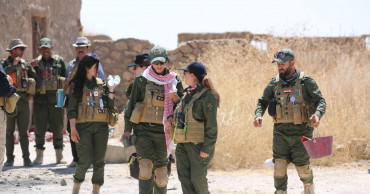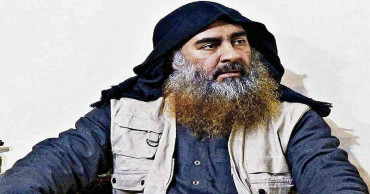IS
Teenagers from Islamic State families undergo rehabilitation in Syria, but future still uncertain
For at least four years, thousands of children have been growing up in a camp in northeast Syria housing families of Islamic State group militants, raised in an atmosphere where the group's radical ideology still circulates and where they have almost no chance for an education.
Fearing that a new generation of militants will emerge from al-Hol Camp, the Kurdish officials who govern eastern and northern Syria are experimenting with a rehabilitation program aimed at pulling children out of extremist thought.
It means, however, removing them from their mothers and families for an unknown period of time, a practice that has raised concerns among rights groups. And even if they are deemed rehabilitated, the childrens' future remains in limbo with their home countries reluctant to take them back.
"If these children stay in the camp, this will lead to the rise of a new generation of extremists who could be more fanatic(al) than those who were before," said Khaled Remo, co-chair of the Kurdish-led administration's office of justice and reform affairs.
Recently, an Associated Press team was allowed to visit the Orkesh Center, a rehabilitation facility that opened late last year. It's home to dozens of young boys taken from al-Hol. Ranging in age between 11 and 18, they represent about 15 different nationalities, including France and Germany.
At Orkesh, boys are taught drawing and music, all with the theme of tolerance. They also learn skills for future jobs like a tailor or a barber. They wake up early and have breakfast at 7 a.m., then have classes until 3 p.m., after which they can play soccer and basketball. They live in dormitory-type rooms, where they are expected to keep order and their beds made. They are allowed contact with parents and siblings.
Authorities did not permit the AP to speak to the boys at the center, citing privacy concerns. During a separate visit to al-Hol, residents were hostile, and none agreed to be interviewed. The AP also approached families that were released from al-Hol, but none responded to requests for comment. The newness of the program makes it difficult to assess its effectiveness.
Still, the center underscores how U.S.-backed Kurdish authorities are wrestling with the legacy of Islamic State, years after the group was defeated in a brutal war in Syria and Iraq that ended in 2019.
Al-Hol Camp is an open wound left by that conflict. The camp holds about 51,000 people, the vast majority women and children, including the wives, widows and other family members of IS militants. Most are Syrians and Iraqis. But there are also around 8,000 women and children from 60 other nationalities who live in a part of the camp known as the Annex. They are generally considered the most die-hard IS supporters among the camp residents.
The camp population is down from its height of 73,000 people, mostly because of Syrians and Iraqis who were allowed to go home. But other countries have largely balked at taking back their nationals, who traveled to join IS after the radical group seized large parts of Iraq and Syria in 2014.
Though Kurdish-led security forces run the camp, they have struggled to keep control. IS radicalism remains rife, with fervent followers intimidating others, particularly in the Annex, home to more than 5,000 children.
Children in al-Hol have little to do and little chance for education. Fewer than half the 25,000 children in the camp attend reading and writing classes at its teaching centers.
During a recent tour by the AP inside al-Hol, some young boys threw stones at the reporters. One drew a finger across his throat in a beheading motion as he looked at the journalists.
"Those kids once they reach the age of 12, they could become dangerous and could kill and beat up others," the camp's director Jihan Hanan told the AP.
"So we had a choice, which is to put them at rehabilitation centers and keep them away from the extreme ideology that their mothers carry," she said.
Sheikhmous Ahmad, a Kurdish official overseeing camps for displaced people, said that once the boys turn 13, IS loyalists make them get married to young girls — another reason for removing them.
So far, the number of children going through rehabilitation is small, around 300, all of them boys from the Annex. Ninety-seven are at the recently-launched Orkesh Center, near the border town of Qamishli about a two-hour drive from al-Hol. The rest are at al-Houri, another center that began taking in boys for rehabilitation in 2017, as U.S.-backed, Kurdish-led forces took back territory from IS in Syria.
Al-Houri underscores the long-term problem: Some of the boys have been at the center for years since there is nowhere else to go. The only alternative would be to send them back to al-Hol. Only four children have been repatriated from al-Houri, administrators said.
"While the transfer of these boys to separate detention centers may be well-intentioned, this is not rehabilitation. This is indefinite detention without charge of children, who are themselves victims of ISIS," said Letta Tayler, associate director of the Crisis and Conflict Division at Human Rights Watch.
She said removal from the family may be appropriate if the mother or another relative is victimizing the child. Otherwise, separation could cause further trauma.
"For many of these children, who have survived unimaginable horrors under ISIS and in the camps where they have been held since the fall of ISIS, the mother and other family members are their only source of stability," she said.
Kathryn Achilles, media director of the Syria Response Office at Save the Children International, said separation from the mother "should only ever be as a last resort, addressed by individual countries after families return, in line with their laws."
Hanan, the administrator of al-Hol, said they had few other options. One proposal is to set up rehabilitation centers in or near the camp, she said.
"Maybe in the future we can agree on something with international organizations regarding such centers as they are the best solution for these children," Hanan said.
But Kurdish officials and humanitarian agencies agree that the only real solution is for home countries to take back their citizens.
"Once home, children and other victims of ISIS can be offered rehabilitation and reintegration. Adults can be monitored or prosecuted as appropriate," said Tayler of Human Rights Watch.
The U.N.-backed Independent International Commission of Inquiry on Syria called in March for repatriation to be sped up. It added that the suffering inflicted on the camp's residents "may amount to the war crime of committing outrages on personal dignity."
Until a solution is found, the centers create "an environment that is suitable to pave the way for mental change for these children," said Remo, the Kurdish official.
2 years ago
IS land mine kills at least 6 civilians in Syria: Reports
A deadly land mine explosion in Syria killed at least six people on Sunday, according to state media.
News agency SANA said the explosion hit civilians who were foraging for truffles in the countryside, and blamed the incident on a land mine planted by the Islamic State group in the southern Deir Ez-Zor province. The area is a former stronghold of the militants.
A day earlier, SANA reported six people - also heading to search for truffles - were killed by an anti-tank mine left by IS in the desert of Homs' eastern countryside.
The Syrian Observatory for Human Rights, a Britain-based war monitor, put the number killed Sunday at nine. The monitor said the incident brings to 139 the number of civilians reported killed this year as a result of the explosion of mines and other explosive objects left over from the war, including 30 children.
The truffles are a seasonal delicacy that can be sold for a high price. Since truffle hunters work in large groups in remote areas, IS militants have repeatedly preyed on them, emerging from the desert to abduct them, kill some and ransom others for money.
In February, IS sleeper cells attacked workers collecting truffles near the central town of Sukhna, killing at least 53 people, mostly workers but also some Syrian government security forces.
2 years ago
IS group says it killed more than 35 ‘Christians’ in Congo
The Islamic State group has issued a statement claiming responsibility for killing more than 35 people and wounding dozens in eastern Congo.
In the statement, posted Friday by Aamaq, the militants' news agency, it said it killed “Christians” with guns and knives and destroyed their property in Mukondi village in North Kivu province. It also published a photo of the houses on fire.
The announcement comes after local authorities confirmed that at least 45 people were killed last week in several attacks on different villages by rebels from the Allied Democratic Forces, a militia with links to IS.
Also Read: Bomb kills 1, wounds 5 at press award event in Afghanistan
Conflict has been simmering in eastern Congo for decades as more than 120 armed groups fight for power, influence and resources, and some to protect their communities. The ADF has been largely active in North Kivu province but has recently extended its operations into neighboring Ituri province and to areas near the regional capital, Goma.
Efforts to stem the violence against ADF have yielded little. A nearly year-long joint operation by Uganda and Congo’s armies did not achieve the expected results of defeating or substantially weakening the group, said a report in December by a panel of U.N. experts. The ADF rebels are accused by the U.N. and rights groups of maiming, raping and abducting civilians, including children. Earlier this month the United States offered a reward of up to $5 million for information that could lead to the capture of the group’s leader, Seka Musa Baluku.
On Thursday, AP reporters saw bodies lowered into a mass grave in Mukondi. Community members shoveled dirt over the bodies against a backdrop of destroyed houses and said the government wasn't doing enough to protect them.
“As you see in Mukondi, it is always the same. ADF, which is always ill-intentioned against the Congolese," said Col. Charles Ehuta Omeonga, military administrator for Beni region. “We lost many of our brothers,” he said.
The United Nations peacekeeping mission in Congo has condemned the killings and is urging Congo’s authorities to investigate and bring those responsible to justice.
2 years ago
Afghan Taliban kill 8 in raids of IS hideouts in Afghanistan
Afghanistan's ruling Taliban killed eight Islamic State militants and arrested nine others in a series of raids targeting key figures in a spate of attacks in Kabul, a senior Taliban government spokesman said Thursday.
Zabihullah Mujahid, spokesman for the Taliban government, said the raids in the capital city and western Nimroz province on Wednesday targeted IS militants who organized recent attacks on Kabul’s Longan Hotel, Pakistan’s embassy and the military airport.
Eight IS fighters, including foreign nationals, were killed and seven others arrested in Kabul, while a separate operation in western Nimroz province resulted in two more IS arrests, Mujahid said.
“These members had a main role in the attack on the Chinese hotel and paved the way for foreign IS members to come to Afghanistan,” Mujahid said in a tweet.
The Islamic State group claimed responsibility for a deadly bombing near a checkpoint at the Afghan capital’s military airport Sunday. IS said that attack was carried out by the same militant who took part in the Longan Hotel assault in mid-December.
The regional affiliate of the Islamic State group — known as the Islamic State in Khorasan Province and a key rival of the Taliban — has increased its attacks in Afghanistan since the Taliban takeover in 2021. Targets have included Taliban patrols and members of Afghanistan’s Shiite minority.
Read more: Roadside bomb kills 6 people in north Afghanistan: Taliban
IS published a photo of the attacker, identifying him as Abdul Jabbar, saying he withdrew safely from the attack on the hotel after he ran out of ammunition. It added he detonated his explosives-laden vest targeting the soldiers gathered at the checkpoint.
Mujahid said light weapons, hand grenades, mines, vests and explosives were confiscated by the Taliban’s security forces during the raids on an IS hideout in the Shahdai Salehin neighborhood. Local residents reported sounds of several explosions and an hourslong gun battle.
The Taliban swept across the country in August 2021, seizing power as U.S. and NATO forces were in the last weeks of their final withdrawal from Afghanistan after 20 years of war.
Read more: Taliban: 2 civilians killed in a bomb blast in Afghanistan
3 years ago
Iraqi soldiers kill nine IS militants
Iraqi soldiers killed nine militants of the Islamic State on Wednesday during an operation in the northern province of Kirkuk, the Iraqi military said.
Iraqi soldiers surrounded nine militants holed up in a tunnel in Kraw Mountain there, some 250 km north of Baghdad, bombed the tunnel and killed all the militants inside, the media office of the Iraqi Joint Operations Command said in a statement.
READ: U.S. carries out airdrops in Syria's Hasakah, kills 8 IS militants
Over the past few months, Iraqi security forces have carried out operations against the extremist militants to crack down on their intensified activities.
The security situation in Iraq has been improving since 2017. However, Islamic State remnants have melted into urban centers, deserts and rugged areas, carrying out frequent guerilla attacks against security forces and civilians.
3 years ago
Islamic State degraded in Afghanistan but still poses threat
Tribal elder Dawlat Khan still has nightmares about fighters from the local affiliate of the global Islamic State terror network who swept across his and other villages in eastern Afghanistan five years ago.
The extremists, including Afghans, Pakistanis, Arabs and men from Central Asia, quickly imposed a reign of terror. They kidnapped some locals who worked for the Afghan government, later dropping off their decapitated corpses in public places. In one instance, villagers were summoned to a beheading where some fainted while others froze as they watched in horror.
Militants of the Islamic State group have since been driven back into the mountains by blistering U.S. and Afghan bombing raids and a fierce ground campaign by the Taliban, Afghanistan’s homegrown insurgents. The Taliban, eager to expand their domestic political power, pledged to the Trump administration last year they would prevent any attacks on the West from Afghan soil after foreign troops leave.
Also read: As Biden improves with vets, Afghanistan plan a plus to some
Recent success in containing IS is central to the calculus of President Joe Biden, who decided earlier this month to pull all remaining U.S. troops out of Afghanistan by the summer. Biden argues that threats to the West, whether by IS or remnants of the al-Qaida network, can be defused from a distance.
Yet there are concerns that in the potential chaos of a post-withdrawal Afghanistan, IS “will be able to find additional space to operate,” said Seth Jones, senior vice-president at the Center for Strategic and International Studies in Washington.
Some note that it took more than three years to dislodge and degrade IS fighters, many of them ethnic Pashtuns from Pakistan’s tribal regions and Afghans from the northeastern Nangarhar and Kunar provinces. The retreating militants left behind mined roads and fields.
Khan, the tribal leader, fled his village of Pananzai with his six brothers and their families at the height of the battles against IS. They’re not rushing home, even though the family of 63 people is crammed into nine small rooms in Nangarhar’s provincial capital of Jalalabad.
“We are afraid they will return,” Khan, a father of 12, said of IS fighters.
Biden has said he will hold the Taliban accountable for their commitment not to allow terror threats against the U.S. or its allies from Afghan soil. The U.S. invaded Afghanistan 20 years ago after al-Qaida militants, hosted by the Taliban, staged the Sept. 11 terrorist attacks.
In recent years, Washington has come to see the Taliban as a national force, with no ambitions beyond their borders, according to a U.S. defense official who spoke on condition of anonymity in line with regulations.
The Taliban, familiar with mountain caves and dirt paths in remote terrain, are a useful ally against IS, which is viewed by the U.S. as the greatest threat emanating from Afghanistan, the official said.
In justifying his withdrawal decision, Biden noted that terror threats are “metastasizing around the globe” and that “keeping thousands of troops grounded and concentrated in just one country, at the cost of billions each year, makes little sense to me and our leaders.”
The withdrawal is under way, with the final phase starting Saturday. By Sept. 11, America will have withdrawn its last 2,500 to 3,500 troops, and about 7,000 allied forces from NATO are following the same timetable.
But there are concerns about IS re-emerging, particularly if the Taliban and the Afghan government can’t reach a power-sharing deal. Intra-Afghan peace talks remain stalled, despite U.S. efforts to jump start them.
Ongoing fighting between the Taliban and the government could further erode the morale of Afghanistan’s 300,000-plus security forces who sustain heavy casualties daily and are plagued by widespread corruption. It’s unclear how the troops can be a bulwark against new terrorist threats.
At the same time, IS continues to recruit among radicalized university students and disgruntled Taliban, said a former Afghan security official who spoke on condition of anonymity because he was not authorized to talk to reporters.
Also read: US to withdraw all troops from Afghanistan by Sept. 11
IS has also resumed a campaign of targeted killings of minority Shiite Muslims, many of them ethnic Hazaras, as well as women’s rights activists and media workers. They claimed attacks last year on two educational facilities, including Kabul University, that killed more than 50 students. Washington blamed IS for a brutal assault last year on a maternity hospital in a largely Hazara neighborhood of Kabul. Infants and pregnant women were killed.
In March, seven Hazaras who worked in a stucco factory in the eastern city of Jalalabad were killed in an attack claimed by IS. The assailants tied their victims’ hands behind their backs and shot each with a single bullet to the back of the head.
Some residents there are afraid to point the finger at IS, fearing they might be targeted next.
IS operatives are said to occupy an entire neighborhood near the central Talashi roundabout. They have infiltrated the motorized rickshaw business and use the vehicles for targeted killings, said taxi driver Saida Jan.
Evan Kohlmann, a terrorism consultant, said for a while it appeared the IS presence in Afghanistan and surrounding regions “was all but dead,” but the group’s operations “have since resumed in earnest.”
“They represent a significant terrorist threat, but their tactics remain in the realm of assassination and sabotage,” said Kohlmann, who has worked with the FBI and the Nine Eleven Finding Answers Foundation that emerged following the assaults on America.
“They don’t seem to be in a strong position of conquering and holding territory,” or of threatening the U.S., he said.
The Taliban say they have made good on promises to the U.S. by ordering fighters to keep non-Afghans from their ranks, and telling al-Qaida to leave the region. Some analysts say they’re not convinced the Taliban have distanced themselves from groups like al-Qaida.
U.S. officials, meanwhile, acknowledge the withdrawal will reduce Washington’s intelligence gathering capacities, even if IS and al-Qaida aren’t in a position to attack U.S. targets from Afghanistan.
Asfandyar Mir at Stanford University’s Center for International Security and Cooperation said the U.S. will be able to continue technical eaves-dropping from a distance, while on-the-ground intelligence gathering will weaken further.
Also read: At least 30 police killed, over 20 wounded in suicide car bomb explosion in E. Afghanistan
“The U.S. campaign in Afghanistan has been notoriously poor at getting good information and being played by rent-seeking actors, the cost of which is borne by innocent civilians in raids and strikes gone wrong,” said Mir.
“With U.S. forces out, and unable to provide security to potential informers, existing sources will dwindle and opportunities for bad actors to dupe the U.S. will grow,” he said.
4 years ago
Pope visits Iraq's war-ravaged north on last day of tour
Pope Francis arrived in northern Iraq on Sunday, where he planned to pray in the ruins of churches damaged or destroyed by Islamic State extremists and celebrate an open-air Mass on the last day of the first-ever papal visit to the country.
4 years ago
IS claims killing of 3 female media workers in Afghanistan
The Islamic State group has claimed responsibility for the killing of three women working for a local radio and TV station in eastern Afghanistan, the latest in a spike in targeted killings across the war-tor country. Dozens of people gathered Wednesday for the funerals of the three media workers.
5 years ago
IS remains at center of transnational terrorism threat: UN
The UN counter-terrorism chief on Friday said the Islamic State (IS) remains at the center of the transnational terrorism threat, despite its defeat in Syria last March and the death of its longtime leader in October.
6 years ago
IS tries to stage comeback amid rising US-Iran tensions
The Islamic State group's self-styled "caliphate" across parts of Iraq and Syria seemed largely defeated last year, with the loss of its territory, the killing of its founder in a U.S. raid and an unprecedented crackdown on its social media propaganda machine.
6 years ago





.jpg)
.jpg)








